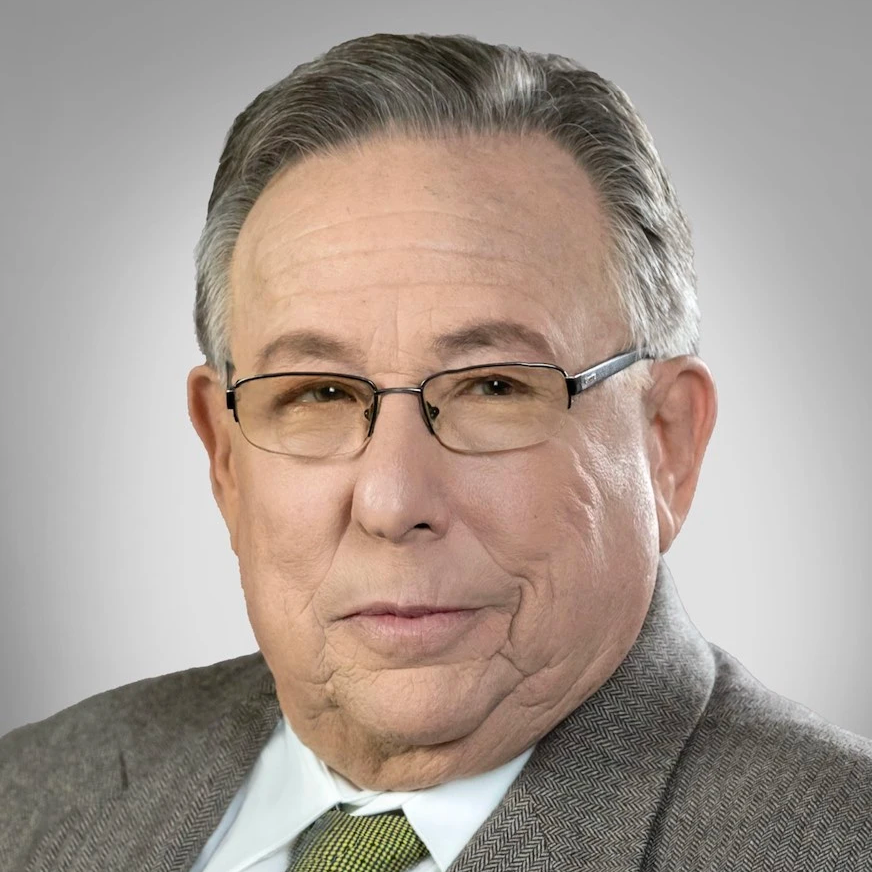Substance Abuse Triggers
Substance abuse triggers are situations, emotions, or environments that provoke a strong urge to use drugs or alcohol. They fall into two categories: external triggers and internal triggers. Identifying these triggers is crucial for recovery, as it helps individuals manage cravings and reduce relapse risk. Recognizing both types of triggers supports long-term sobriety.
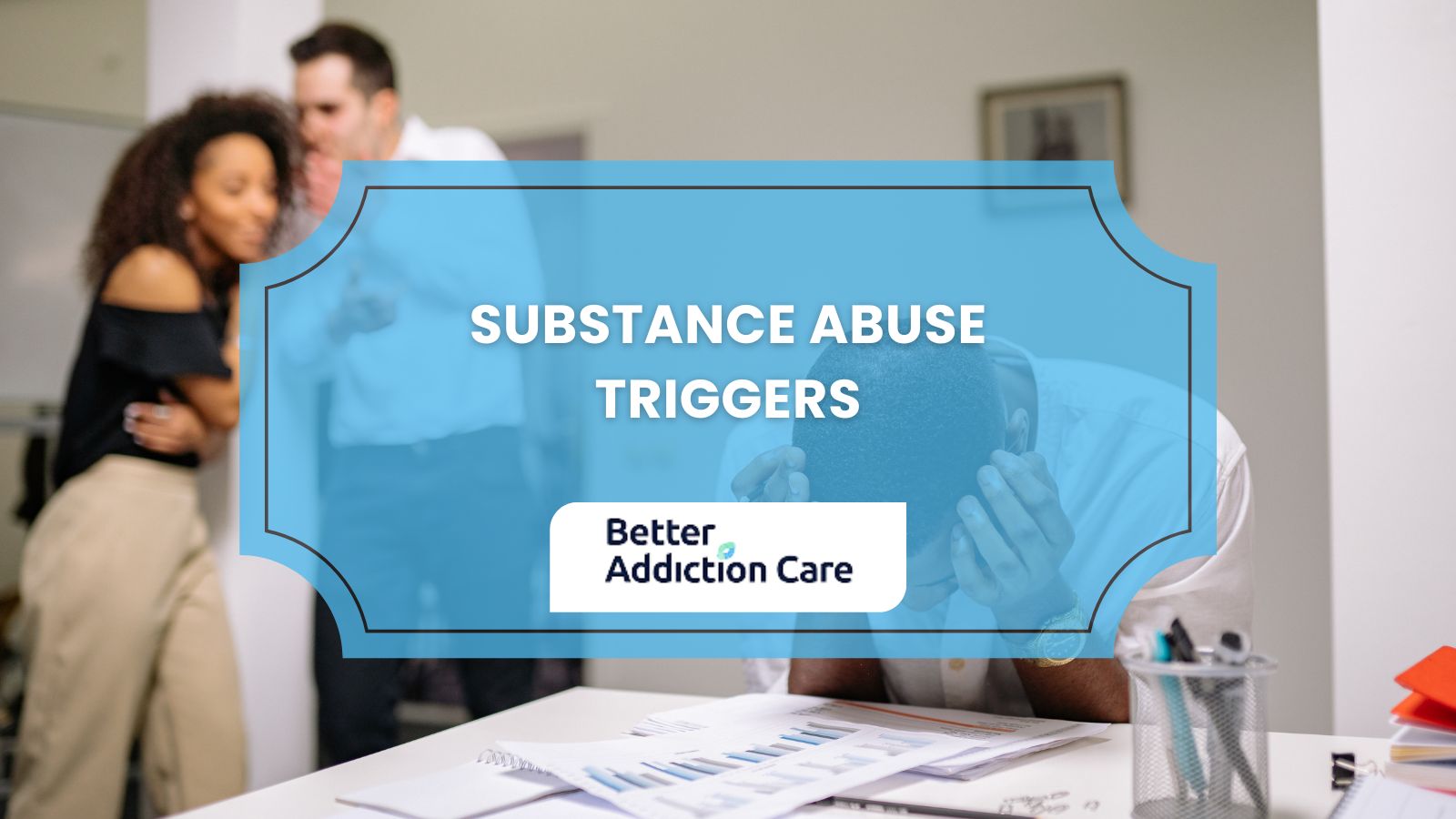
External triggers for substance use include people, places, situations, and things. Relationships with substance-abusing individuals complicate sobriety, increase temptation, and heighten the risk of substance abuse or relapse. Identifying these relationships, such as former dealers or friends, is essential.
Common internal triggers for substance abuse include positive emotions, negative emotions, and neutral states. Positive emotions, such as happiness or excitement, lead to substance use linked to past celebratory moments and contribute to relapse. Negative emotions, including fear, guilt, or loneliness, drive individuals to use substances as coping mechanisms, increasing relapse likelihood. Neutral states, such as boredom, fatigue, or routine stressors, trigger habitual substance use and result in relapse.
According to Sinha R.’s 2011 study, ‘New findings on biological factors predicting addiction relapse vulnerability, ’ over 66% of individuals relapse within weeks to months after starting treatment for substance use disorders. Studies indicate that more than 85% relapse within one year across alcohol, nicotine, weight, and illicit drug abuse categories.
What Are Substance Abuse Triggers?
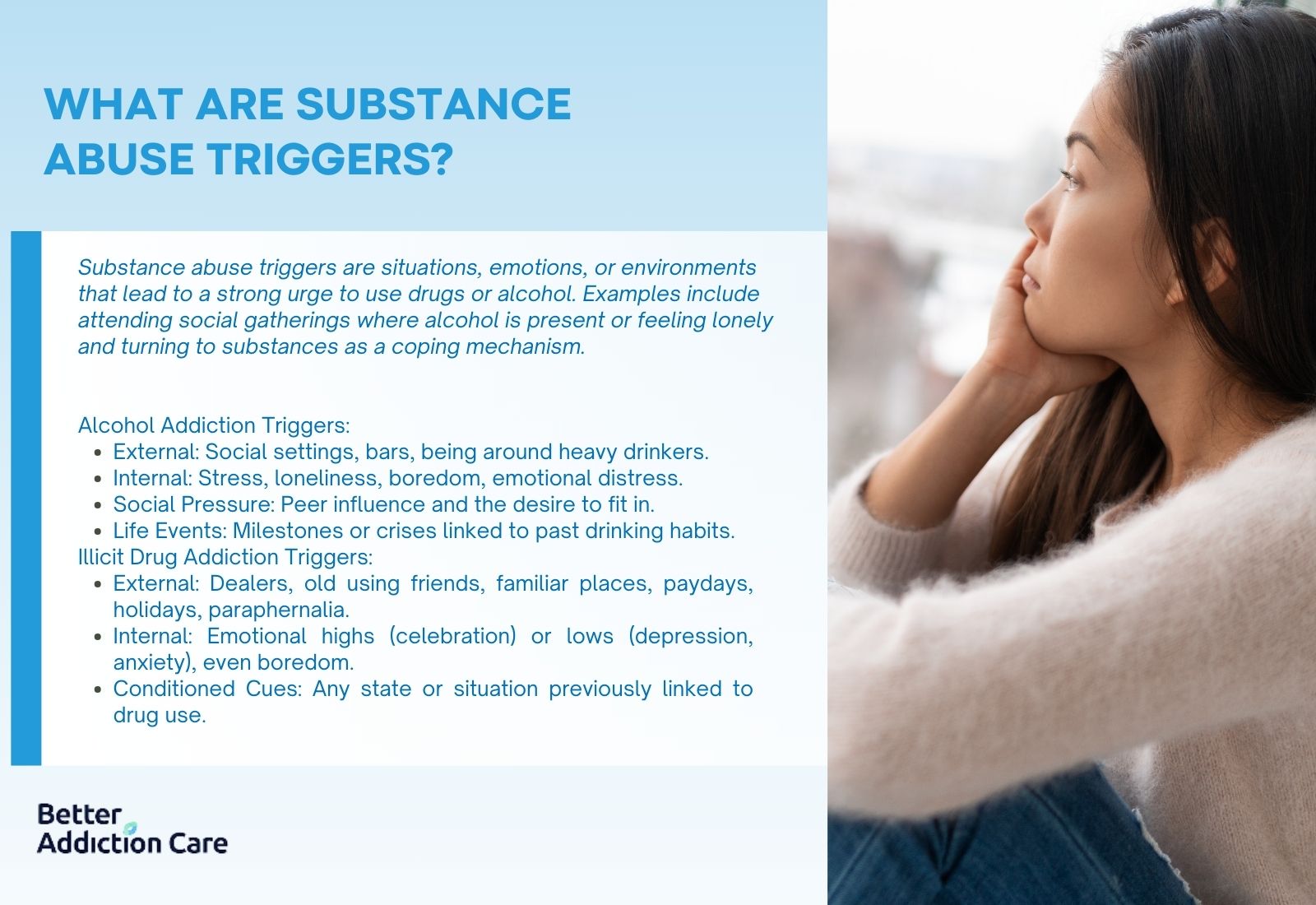
Substance abuse triggers are situations, emotions, or environments that lead to a strong urge to use drugs or alcohol. Examples include attending social gatherings where alcohol is present or feeling lonely and turning to substances as a coping mechanism. Triggers fall into two categories: external and internal. External triggers involve places, people, or scenes like movies featuring substance use. Internal triggers involve emotions such as sadness, anger, or boredom. Recognizing these triggers is a key step in managing recovery and avoiding relapse.
How Can Substance Abuse Addiction Triggers Be Identified?
Identifying substance abuse addiction triggers involves recognizing factors that provoke cravings or urges to use substances. These triggers fall into physical, psychological, social, or emotional categories and are often grouped as external or internal.
External triggers include environments or situations tied to past substance use, while internal triggers involve personal emotions or thoughts. Journaling or working with a therapist helps individuals recognize their unique triggers and understand their influence on behavior.
What Are External Substance Abuse Triggers?
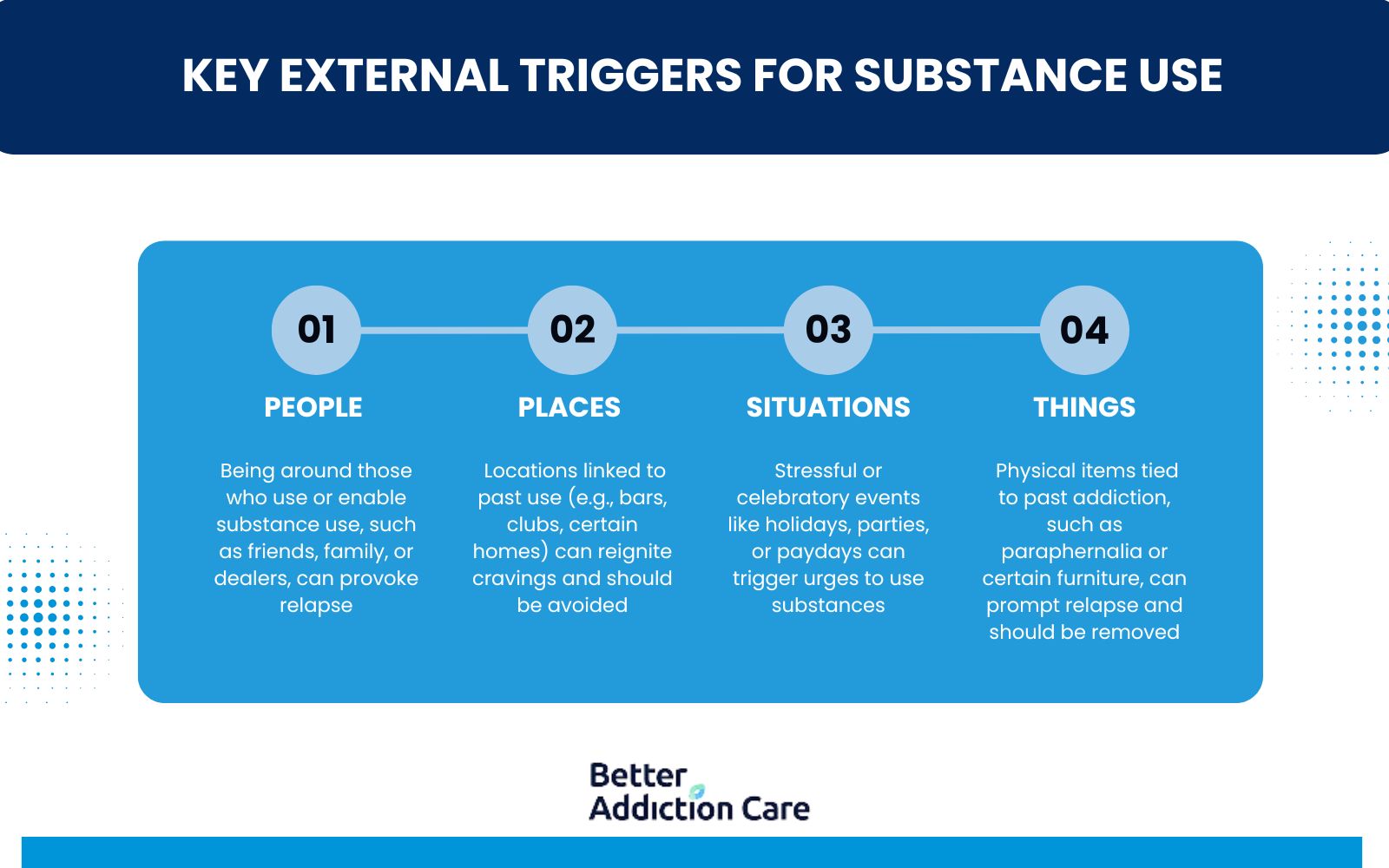
External substance abuse triggers include people, places, situations, and things that are associated with past substance use and reignite cravings or urges to engage in addictive behaviors.
Here are the key external triggers for substance use and how to identify and cope with them:
People: Maintaining relationships with individuals who abuse alcohol and drugs complicates sobriety for a recovering person. Substance-abusing family members and friends pressure the person in recovery to engage in addictive behaviors, increasing the temptation to conform for fear of alienation. Additionally, staying with family and friends unaware of their negative impact on recovery progress proves harmful. These individuals offer alcohol, believing it poses no harm or interferes with treatment.
Triggers include former drug dealers, spouses, friends, family members, employers, co-workers, and neighbors. A person in recovery identifies and avoids these external triggers by asking specific questions:
-
With whom did you use drugs or drink alcohol?
-
Who supplied you with these substances?
-
Do you still have the contact details of these people?
-
If they are still drinking or using drugs, how should you approach them?
Places: Places serve as reminders of a recovering person’s former lifestyle. These locations include areas associated with drug and alcohol use, places of isolation or abuse, and neighborhoods where substance-abusing family members and friends reside.
Common examples of triggering locations include former drug-stash spots, clubs, bars, concert venues, worksites, friends' homes, bathrooms, hotels, and schools.
According to Viera, A.’s 2025 study, ‘Responding to location-based triggers of cravings to return to substance use: A qualitative study’, location-based triggers present significant barriers to recovery. Research with 31 treatment participants identified triggers as interrelated with multiple factors. "Home" emerged as a primary trigger location that challenges recovery. Avoidance functioned as the predominant coping strategy. Substance use correlated with time outside the home, while recovery was associated with limited travel. These findings indicate the need for targeted interventions focused on location-based trigger coping strategies.
If uncertainty exists regarding whether a location serves as a trigger, consider asking the following questions:
-
Where did you drink alcohol or use drugs in the past?
-
Do you pass by these locations as you go about your daily tasks?
-
How can you avoid these locations?
-
If you encounter anyone who offers you alcohol or drugs, how should you react?
Situations: Certain situations serve as external triggers. High-stress situations and events that involve celebration act as triggers. Holidays represent times of merriment for many, but for a person recovering from addiction, holidays involve attending social events and interacting with friends and family members who still use drugs. These events expose recovering individuals to addictive substances.
Paydays trigger individuals who previously spent their salary on drugs, increasing the risk of relapse during this time.
Common situations that serve as triggers include parties, recovery group meetings, holidays, family gatherings, and calls from creditors. Additionally, activities and behaviors that serve as triggers include staying alone at home, driving, preparing for or returning from a date, paying bills, and dining out.
These are questions one should ask if faced with a potentially triggering situation:
-
Is there an upcoming event, like a holiday or concert, that can serve as a trigger?
-
Does your current situation spark an urge to use addictive substances?
-
Does your current situation force you to think about substance abuse?
-
Would it be possible to leave or avoid the situation entirely?
Things: Being around items associated with addiction triggers a person’s urge to drink alcohol or use drugs. After committing to a sober life, a person must part with objects linked to addiction. One of the first actions involves disposing of drug paraphernalia. Additionally, individuals must avoid keeping everyday items that are frequently used during the peak of addiction. These items include furniture and reading materials such as books and magazines.
Here are a few questions that help people identify and eliminate objects that serve as triggers:
-
What items did you use with alcohol or drugs?
-
Do you have a sober friend or family member who can help you get rid of the triggers in your home or at work?
-
How soon can your sober friend or family member collect the items that remind you of your former lifestyle?
What Are Internal Substance Abuse Triggers?
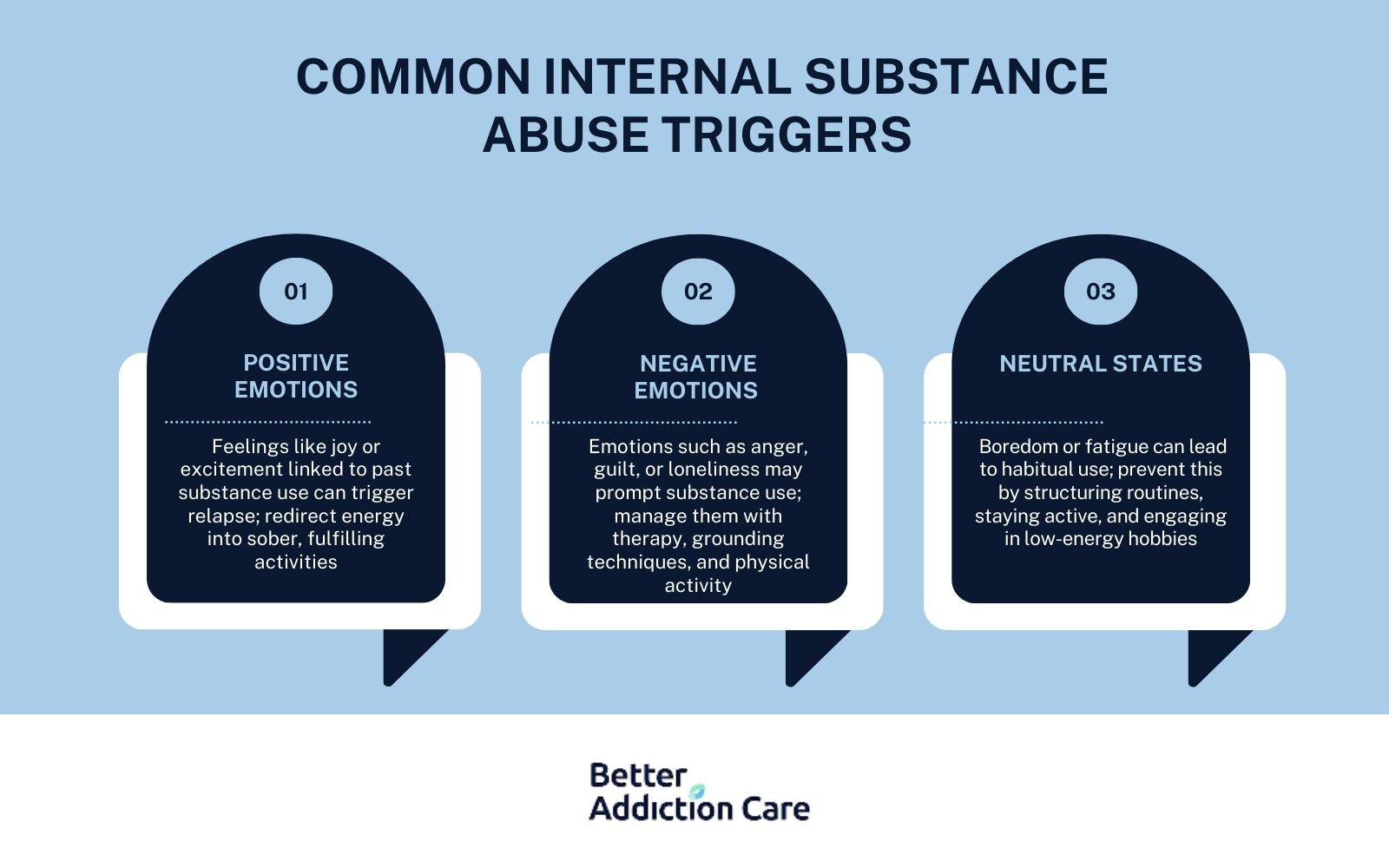
Internal substance abuse triggers refer to emotions and thoughts formerly associated with addiction. These internal triggers prove more challenging to manage than external triggers. When these feelings or thoughts arise, distancing oneself from them becomes difficult. These internal triggers urge a recovering person to make decisions and engage in activities that negatively impact recovery.
Here are the common internal substance abuse triggers and ways to cope with them :
Emotions (Positive): Positive emotions are happiness, excitement, confidence, or passion that have previously become linked to substance use.
Strategies to address positive emotions focus on redirecting euphoria into healthy outlets:
-
Reflect on past associations between these emotions and substance use (e.g., “Did celebratory moments involve alcohol?”).
-
Redirect euphoria into structured sober activities such as creative projects, physical exercise, or socializing without substances.
-
Set clear boundaries during triggering events by planning alcohol-free celebrations or informing others of sobriety commitments.
Emotions (Negative): Negative emotions are fear, guilt, anger, loneliness, or shame that previously led to substance use as a coping mechanism.
Strategies to manage negative emotions focus on acknowledging feelings and replacing substance use with therapeutic practices:
-
Acknowledge emotions without judgment and employ grounding techniques like the 5-4-3-2-1 sensory exercise.
-
Replace substance use with therapeutic practices such as journaling, therapy sessions, or conversations with peer support groups.
-
Engage in physical activity to regulate mood, such as yoga, walking, or strength training.
Neutral States: Neutral states are boredom, fatigue, or routine stressors that previously triggered habitual substance use.
Strategies to manage neutral states focus on reducing vulnerability to habitual responses:
-
Structure daily routines to minimize idle time by scheduling hobbies, work tasks, or mindfulness practices.
-
Incorporate movement breaks like stretching or short walks to combat fatigue and reset focus.
-
Plan low-energy activities such as reading, puzzles, or listening to podcasts during moments of boredom.
When faced with an internal trigger, a person in recovery asks the following questions to manage the thought or emotion:
-
How can I change this feeling or behavior?
-
What are the advantages and disadvantages of this behavior?
-
What types of behaviors are healthier than the one I’m having right now?
-
What are the benefits and risks of reaching out to family or friends?
How Can Individuals Effectively Manage Boredom To Prevent Triggering Substance Abuse Addiction?
To effectively manage boredom and prevent substance abuse triggers, individuals should reframe boredom as an opportunity for growth (e.g., practice mindfulness, explore hobbies), stay socially connected to sober peers or family, avoid passive time-killers like excessive screen use, and pursue structured goals or chores to create purpose and divert away from boredom. Engaging in creativity, outdoor activities, or new skills also redirects focus away from cravings.
What Are Some Common Triggers For Alcohol Addiction?
Common triggers for alcohol addiction include external factors like people, places, and situations linked to past drinking habits, such as social environments where alcohol is common or being around heavy drinkers. Internal triggers involve emotional states like stress, loneliness, or boredom, which lead to drinking as a way to cope. Social pressures and the need to fit in also play a role, especially among younger individuals seeking acceptance or maturity. Life events, including challenges tied to individual behaviors or life stages, contribute to the risk of alcohol addiction. Identifying these triggers is crucial for managing cravings and staying sober during recovery.
What Are Some Common Triggers For Illicit Drug Addiction?
Triggers for illicit drug addiction include both external and internal triggers. External triggers include people (like dealers or using friends), places (bars, concert venues), situations (holidays, paydays), and objects (drug paraphernalia). Internal triggers consist of emotions that prompt cravings, both positive feelings (happiness, confidence) and negative ones (loneliness, anxiety) that a person previously managed with illicit drugs. Even neutral states like boredom activate cravings when the brain has formed associations between these experiences and substance use.
How to Deal with Addiction Relapse?
To deal with addiction relapse, individuals recognize the three stages of relapse—emotional, mental, and physical—and actively resist cravings, implement coping strategies, seek support, and identify warning signs early. Understanding this progression empowers individuals in recovery to take proactive steps to prevent complete relapse.
According to Sohrabpour, M.’s 2024 study, ‘The factors affecting substance abuse relapse based on theory of planned behavior in male addicts covered by addiction treatment centers in Southern Iran.’, 85.5% of participants had a history of relapse, with 50.29% experiencing 1-5 relapses. The subjects primarily used methamphetamine (59.5%), heroin (53%), opium (48%), and alcohol (40%). Nearly half (48%) had their first substance use between the ages of 16-20, and 34.5% first consumed drugs at friends' houses.
Do Local Drug and Alcohol Rehab Facilities Help with Substance Abuse Triggers and Relapse?
Yes, local drug and alcohol rehab facilities do help with substance abuse triggers and relapse prevention. These specialized centers provide therapeutic strategies and coping mechanisms designed to identify and manage personal triggers that could lead to substance use. Many local drug and alcohol rehab facilities offer comprehensive programs that include counseling, behavioral therapy, and support groups specifically focused on teaching individuals how to recognize high-risk situations and develop healthy responses to them. Through structured treatment plans, patients learn essential skills for maintaining long-term sobriety, including stress management techniques, emotional regulation, and building supportive networks that significantly reduce the likelihood of relapse when returning to their daily environments.
